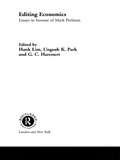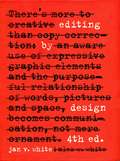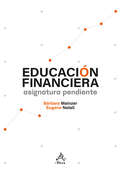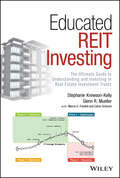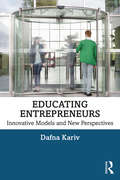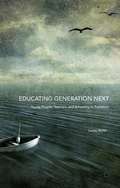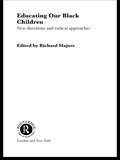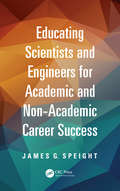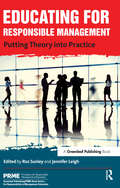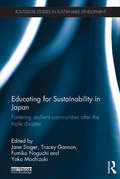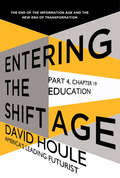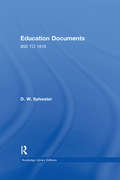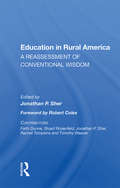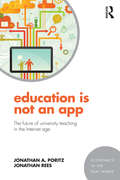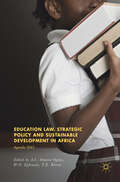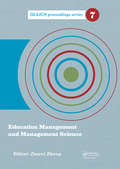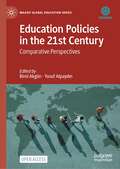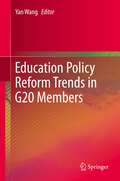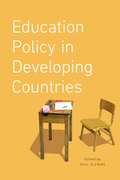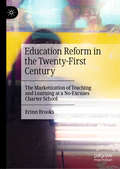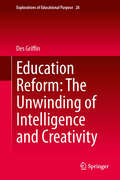- Table View
- List View
Edita: Making Choices in Uncertain Times
by Caroline Elkins Juan Alcacer Alpana Thapar Youssef Abdel AalAfter 15 years of steady growth and expansion, Edita, a leading Egyptian snack producer, faced a series of challenges in the wake of the Arab Spring. In January 2011, the Egyptian Revolution sparked political and economic turmoil that reflected the waves of protest and violence already spreading throughout North Africa and parts of the Middle East. Hani Berzi, CEO of Edita, managed to navigate the company through this period, though the severe devaluation of the Egyptian pound in November 2016 meant yet another period of crisis for the country's economy and, with it, the snack food industry. Hani was faced with a series of hard decisions that would determine Edita's future. He held a crisis management meeting with his executive team and on the agenda were two key decisions. Should they increase their prices as a short-term strategy to survive the turbulent period at the risk of losing market share? Should Edita aim to diversify risk by tapping into underserved rural areas in Egypt or rather by expanding its presence in regional markets? Or, should the company adopt some combination of both strategies, or neither, and instead devise another course for addressing the crisis?
Editing Economics: Essays in Honour of Mark Perlman (Routledge Frontiers Of Political Economy #37)
by G. C. Harcourt Hank Lim Ungsuh K. ParkMark Perlman was the founding editor of the Journal of Economic Literature and responsible for issues from 1969 until 1980 when he retired. He has also written and edited a number of books and articles, concentrating on aspects of the labour market, population growth, health economics, the environment and the history of economics.
Editing by Design: The Classic Guide to Word-and-Picture Communication for Art Directors, Editors, Designers, and Students
by Alex W. White Jan V. WhiteAn Industry Classic, Revised for the Modern Age This classic guide to winning readers for designers, art directors, and editors, has been completely updated to be applicable to both online and print publication design. Because it has truths about effective visual communication that transcend ever-changing technology, this book has been in continuous publication since 1974. Revised with the careful attention of widely respected author and professor of graphic design Alex W. White, Editing by Design, Fourth Edition, describes how both word people and design people have the same task: to reveal the true core of each message as plainly and compellingly as possible. It is a book vital to creators of today&’s online and print media. Readers will find ways to marry content and form, helping story and design to reinforce each other, and create pages that are irresistible. Brimming with three hundred illustrations, chapters cover a wealth of design and editing matters, including: How to think about &“editing&” and &“design&” as a word person and a design personTeamwork and collaboration for story clarityOriginality and inducement for the readerColumns and grids for organization and consistencyCovers and content listings as tools for deeper reader involvementHow to use type hierarchy to catch and lure readersRepresentational and non-representational imageryUsing color as a branding device Readers will learn how editor-designer collaboration can achieve maximum creative impact through the effective use of words, images, and space. Full of practical examples, this book is equally for designers looking for a deeper understanding of how to design better and for writers and editors wanting to communicate more vividly with the utmost impact, as well as for editorial directors and publishers seeking a competitive advantage.
Educación financiera: asignatura pendiente
by Bárbara Mainzer Eugene NataliEl dinero está muy presente en nuestras vidas cotidianas. Cada día nos enfrentamos a nuevos desafíos financieros. Tomamos decisiones financieras todos los días. Y, en general, no estamos preparados para tomarlas. Prepararse con tiempo y aprender a pensar en estos temas aumenta las chances de mejorar nuestra calidad de vida. Permite tener más oportunidades y más opciones. Este libro tiene como objetivo ayudarte a tomar decisiones de manera más informada para que puedas construir un futuro mejor. Es una caja de herramientas con la que aprenderás conceptos esenciales sobre educación financiera, una materia poco tenida en cuenta en la formación escolar en nuestro país, pero que consideramos fundamental.
Educate to Innovate: Based on Input from Innovators and Stakeholders
by Arden Bement Jr.Robust innovation in the United States is key to a strong and competitive industry and workforce. Efforts to improve the capacity of individuals and organizations to innovate must be a high national priority to ensure that the United States remains a leader in the global economy. How is the United States preparing its students and workers to innovate and excel? What skills and attributes need to be nurtured? The aim of the Educate to Innovate project is to expand and improve the innovative capacity of individuals and organizations by identifying critical skills, attributes, and best practices - indeed, cultures - for nurturing them. The project findings will enable educators in industry and at all levels of academia to cultivate the next generation of American innovators and thus ensure that the U. S. workforce remains highly competitive in the face of rapid technological changes. Educate to Innovate summarizes the keynote and plenary presentations from a workshop convened in October 2013. The workshop brought together innovators and leaders from various fields to share insights on innovation and its education. This report continues on to describe the specific skills, experiences, and environments that contribute to the success of innovators, and suggests next steps based on discussion from the workshop.
Educated REIT Investing: The Ultimate Guide to Understanding and Investing in Real Estate Investment Trusts
by Stephanie Krewson-Kelly Glenn R. MuellerLearn to invest in REITs with confidence and skill with this powerful resource Educated REIT Investing is the ultimate resource for investors, financial advisors, and students interested in learning how to invest in real estate investment trusts (REITs)—one of the only asset classes to significantly outperform the S&P 500 Index over the last 25 years. Written by Stephanie Krewson-Kelly and Glenn R. Mueller, PhD., both accomplished REIT authors and investors with six decades of accumulated industry experience between them, Educated REIT Investing provides all the basics and history, then blends pragmatic strategies and advice with a thorough exploration of the fundamentals and nuances of the REIT industry. Topics include: Basic information about REITs and the REITs industry Terminology specific to the REIT industry, explained in plain-English Historical REIT industry performance tables and trading perspectives Analysis and equations needed to calculate key metrics used to identify the suitability of companies for investment purposes, illustrated with simple examples This book is perfect for anyone looking for a straightforward, easy-to-understand resource to establish or improve their understanding and analysis of real-estate investment trusts.
Educating Children in Poor Countries
by Arye L. Hillman Eva JenknerIn an ideal world, primary education would be universal and publicly financed, and all children would be able to attend school regardless of their parents' ability or willingness to pay. In many poor countries, however, governments lack either the financial resources or the political will to provide each child with a basic education, despite the benefits that would accrue not only to individuals but to society as a whole. In some of these countries, parents cover part or all of the cost of their children's education. This paper explores the pros and cons of user payments.
Educating Entrepreneurs: Innovative Models and New Perspectives
by Dafna KarivAs entrepreneurship programs proliferate—from classes in higher education to incubators, accelerators, open innovation platforms, and innovation factories—our understanding of the advantages and challenges of different modes of learning becomes increasingly obscured. In Educating Entrepreneurs, Kariv provides an impressively broad and thorough overview of the field of entrepreneurship education, along with practical tools for students to be able to evaluate the strengths and weaknesses of the different options that exist, as well as for these programs’ developers and managing teams to be able to plan and manage such processes. Examining these programs, which are found both within and outside of academia, along with insights into their challenges and opportunities, should help students grasp the entrepreneurship education field, its goals, target audience, and ecosystem involvement. Kariv supplements this comprehensive evaluation with case studies and examples that tie the theory to practical applications. Students can read about contemporary ventures, such as Y Combinators, Techstars, and SOSA, giving them concrete examples to relate to. Interviews with program stakeholders around the world complete the view, with an exploration of the cultural and country-based dynamics related to programs developed in specific countries. Being both thorough and informative, this book will serve students and faculty of entrepreneurship courses, as well as practitioners looking to understand their entrepreneurship education options.
Educating Generation Next: Young People, Teachers And Schooling In Transition
by Lucas WalshIs the current industrial model of schooling capable of preparing young people for modern working life? This book provides an unsettling picture of the challenges young people face following the uncertainty of the Global Financial Crisis. It asks whether teachers and schooling are able to provide the skills needed in a contemporary global economy.
Educating Our Black Children: New Directions and Radical Approaches
by Richard MajorsExclusion and miseducation of black children is endemic in the US and UK. This book takes a long, hard look at the two countries and uncovers what they can learn from each other in their approaches to tackling this problem. The material in the book is the result of extensive work with educators, researchers and scholars working in the area of education and disaffection in the US and the UK.Richard Majors and his contributors are at the vanguard of research into this topic and this book is one of the most important titles published on the education of black children in recent times.Gathering together the issues and looking at real-world approaches, this book does not simply advance the debate: it tables some serious solutions to serious problems.This is a ground-breaking book based on cutting-edge research from writers and experts recognised the world over for their expertise. People will take note of what this book has to say.
Educating Scientists and Engineers for Academic and Non-Academic Career Success (ISSN)
by James SpeightIn an increasingly technological world, the education of scientists and engineers has become an activity of growing importance. Educating Scientists and Engineers for Academic and Non-Academic Career Success focuses on the structure of the current educational system and describes the transformations needed to ensure the adequate education of future
Educating for Responsible Management: Putting Theory into Practice (The Principles for Responsible Management Education Series)
by Roz Sunley Jennifer LeighIt is well known the global community is looking towards business to play its role in creating a just and fair economy. This increases the urgency and relevance of new approaches to management education that can engage and foster socially responsible leaders who are resilient, creative and innovative thinkers. Educating for Responsible Management profiles cutting-edge approaches to pedagogy for the Principles for Responsible Management Education (PRME) that go beyond current discussions of sustainability and corporate social responsibility content, to include a wider lens that highlights the processes of educating the next generation of responsible managers. The book draws together leading thinkers, practitioners and management education to share their practice and research on how management educators can prepare themselves, their students, the learning environment, and their teaching resources to meet these challenges. These conversations across practice lines highlight a range of innovative pedagogical approaches and methods used by responsible management educators around the world to provide effective learning experiences.
Educating for Sustainability in Japan: Fostering resilient communities after the triple disaster (Routledge Studies in Sustainable Development)
by Jane Singer Tracey Gannon Fumiko Noguchi Yoko MochizukiEducating for Sustainable Development (ESD) approaches are holistic and interdisciplinary, values-driven, participatory, multi-method, locally relevant and emphasize critical thinking and problem-solving. This book explains how ESD approaches work in the Japanese context; their effects on different stakeholders; and their ultimate potential contribution to society in Japan. It considers ESD in both formal and informal education sectors, recognizing that even when classroom learning takes place it must be place-based and predicated on a specific community context. The book explores not only ‘Why ESD’, but why and how ESD in Japan has gained importance in the past decade and more recently in the wake of the triple disaster of March 2011. It considers how ESD can help Japan recover and adapt to disasters and take initiative in building more resilient and sustainable communities. This volume asks the questions: What are some examples of positive contributions by ESD to sustainability in Japan? What is the role of ESD in Japan in activating people to demand and work towards change? How can schools, universities and non-governmental organizations link with communities to strengthen civic awareness and community action? After an introduction that elucidates the roots and recent promotion of ESD in Japan, part one of this volume looks at the formal education sector in Japan, while part two examines community-based education and sustainability initiatives. The latter revisits the Tohoku region five years on from the events of March 2011, to explore recovery and revitalization efforts by schools, NGOs and residents. This is an invaluable book for postgraduate students, researchers, teachers and policy makers working on ESD.
Education (Entering the Shift Age, eBook #7)
by David HouleThis book by noted futurist, David Houle, is a call to action for people who are part of a growing movement concerned about education in America and who are committing time and effort toward its transformation. This book is not the answer, but a call to action, an offering of a vision and a necessary expansion of the creative discussion to formulate the solution so essential to the ongoing vitality of our country. The book will look at the roots of American education, the current landscape, and the forces and dynamics that are pushing inevitable change in education for our children. Transformation of education is inevitable and asking the right questions, expanding our vision and starting to do something now are key elements the author outlines. Politicians, principals, school superintendents, and education foundation executives as well as parents should be reading this book as an enabler for their points of view about the need to change K-12 education in the years ahead.
Education Documents: ENGLAND AND WALES 800 TO 1972 (Routledge Library Editions)
by D. W. SylvesterThese collections of documentary material illustrate the main themes of educational history from the early middle ages to the late twentieth century. It contains extensive extracts from every major educational document of this period including royal and parliamentary commissions. Each document is supported by short commentaries and an annotated bibliography. Whilst the main theme is the creation of a genuine national education system, the volumes also address the relations between church and state in education, teacher training, the progressive development from elementary to primary and secondary education for all, and the growth of technical education from a private to a public activity.
Education In Rural America: A Reassessment Of Conventional Wisdom
by Jonathan P. SherIndifference has not always characterized American attitudes toward rural children, nor has neglect always been the cornerstone of state and federal policy toward rural education. Indeed, for nearly a century there was an avid and influential—though ultimately ineffective—rural school reform movement in the United States. But in recent years, rural education has become a "skeleton in the closet" of the education profession. More than 14 million children attend rural schools that receive only minuscule amounts of the nation s financial resources and professional attention. The authors of this book carefully analyze the beliefs, assumptions, policies, and practices that have shaped and continue to shape education in rural America, concluding that conventional wisdom in rural education has proved to be considerably more conventional than wise. They offer pragmatic suggestions for changes in rural schools, in educational policy, and in programs designed for rural communities. As Robert Coles tells us in his Foreword to the book, they "give us clear, strong, uncluttered prose—a good sign that they are able to offer sensible, honest, unpretentious suggestions and useful ideas. They give us. . .a social history that enables perspective . . . and [they give us] practical, well-argued suggestions for a public policy both humane and capable of realization for our rural areas."
Education Is Not an App: The future of university teaching in the Internet age (Economics in the Real World)
by Jonathan Rees Jonathan A. PoritzWhilst much has been written about the doors that technology can open for students, less has been said about its impact on teachers and professors. Although technology undoubtedly brings with it huge opportunities within higher education, there is also the fear that it will have a negative effect both on faculty and on teaching standards. Education Is Not an App offers a bold and provocative analysis of the economic context within which educational technology is being implemented, not least the financial problems currently facing higher education institutions around the world. The book emphasizes the issue of control as being a key factor in whether educational technology is used for good purposes or bad purposes, arguing that technology has great potential if placed in caring hands. Whilst it is a guide to the newest developments in education technology, it is also a book for those faculty, technology professionals, and higher education policy-makers who want to understand the economic and pedagogical impact of technology on professors and students. It advocates a path into the future based on faculty autonomy, shared governance, and concentration on the university’s traditional role of promoting the common good. Offering the first critical, in-depth assessment of the political economy of education technology, this book will serve as an invaluable guide to concerned faculty, as well as to anyone with an interest in the future of higher education.
Education Is Not an App: The future of university teaching in the Internet age (Economics in the Real World)
by Jonathan A. Poritz Jonathan ReesWhilst much has been written about the doors that technology can open for students, less has been said about its impact on teachers and professors. Although technology undoubtedly brings with it huge opportunities within higher education, there is also the fear that it will have a negative effect both on faculty and on teaching standards.Education Is Not an App offers a bold and provocative analysis of the economic context within which educational technology is being implemented, not least the financial problems currently facing higher education institutions around the world. The book emphasizes the issue of control as being a key factor in whether educational technology is used for good purposes or bad purposes, arguing that technology has great potential if placed in caring hands. Whilst it is a guide to the newest developments in education technology, it is also a book for those faculty, technology professionals, and higher education policy-makers who want to understand the economic and pedagogical impact of technology on professors and students. It advocates a path into the future based on faculty autonomy, shared governance, and concentration on the university’s traditional role of promoting the common good.Offering the first critical, in-depth assessment of the political economy of education technology, this book will serve as an invaluable guide to concerned faculty, as well as to anyone with an interest in the future of higher education.
Education Law, Strategic Policy and Sustainable Development in Africa: Agenda 2063
by A. C. Onuora-Oguno W. O. Egbewole T. E. KlevenThis book outlines the findings and suggestions of the Law and Society Association’s International Research Collaborations, which focused on the African Union’s Agenda 2063. This outlined the ideal Africa aspired to by the year 2063: ‘the Africa we want’. The authors examine socio-economic rights issues and their impact on developing a strong educational agenda that can drive Africa to realize Agenda 2063. As Africa’s development has remained slow in the face of many challenges, the need to embrace good governance, rule of law and human rights obligations are major tools to realize the continent’s potential. The project focuses in particular on the central place of education law and policy in achieving the goals of Agenda 2063.
Education Management and Management Science: Proceedings of the International Conference on Education Management and Management Science (ICEMMS 2014), August 7-8, 2014, Tianjin, China (IRAICS Proceedings)
by Dawei ZhengThis proceedings volume contains selected papers presented at the 2014 International Conference on Education Management and Management Science (ICEMMS 2014), held August 7-8, 2014, in Tianjin, China. The objective of ICEMMS2014 is to provide a platform for researchers, engineers, academicians as well as industrial professionals from all over the wo
Education Policies in the 21st Century: Comparative Perspectives (Maarif Global Education Series)
by Yusuf Alpaydın Birol AkgünThis open access book explores the agenda of education policies in the 21st century. In the first part of the book, education is handled from a historical and political framework, and the effects of the change of states and policies on education are examined. In the second part, the effects of changes in the economy on education policies and economies’ demands from educational institutions are examined. In the last section, current policies in the international education sector, which is growing day by day as a result of increasing globalization and internationalization, are examined and future trends are tried to be revealed. In articles written by academics from different universities all over the world, the topics are presented in a comparative perspective.
Education Policy Reform Trends in G20 Members
by Yan WangG20 members bring together the world's major advanced and emerging economies, as well as the European Union. Together they represent some 90% of global GDP, 80% of global trade and two-thirds of the world's population. In recognition of educational development as a key driver of economic development, the G20 members have put education reform high on their policy agenda in order to meet the challenges and embrace the opportunities ahead. Their experiences and lessons in education reform will not only showcase the global trend of education development, but also will provide valuable reference and inspiration for undertaking education reform to advance national development in China as well as other countries. This book documents recent policy reform in G20 members' systems, showcases the global trends in education policy, serves as a valuable reference tool and also provide inspiration for undertaking education reform to advance development in related countries.
Education Policy in Developing Countries
by Paul GlewweAlmost any economist will agree that education plays a key role in determining a country’s economic growth and standard of living, but what we know about education policy in developing countries is remarkably incomplete and scattered over decades and across publications. Education Policy in Developing Countries rights this wrong, taking stock of twenty years of research to assess what we actually know—and what we still need to learn—about effective education policy in the places that need it the most. Surveying many aspects of education—from administrative structures to the availability of health care to parent and student incentives—the contributors synthesize an impressive diversity of data, paying special attention to the gross imbalances in educational achievement that still exist between developed and developing countries. They draw out clear implications for governmental policy at a variety of levels, conscious of economic realities such as budget constraints, and point to crucial areas where future research is needed. Offering a wealth of insights into one of the best investments a nation can make, Education Policy in Developing Countries is an essential contribution to this most urgent field.
Education Reform in the Twenty-First Century: The Marketization of Teaching and Learning at a No-Excuses Charter School
by Erinn BrooksThis book explores how, why, and with what consequences one no-excuses charter network marketizes teaching and learning, through the author’s 1000 hours of covert participant observation at a network charter school. In her research, Brooks found that the “AAG” (pseudonym) network re-conceptualized teaching by urging staff to envision their careers in corporate education rather than in classroom teaching. While some employees received a boost up the corporate ladder, others found themselves being pushed out of the organization. Despite AAG’s equity-conscious discourse, administrators emphasized controlling student behavior as a central measure of teaching effectiveness. Brooks develops the concept of creative compliance to describe the most successful teachers’ tactics for adhering to formal policies strategically, bending the rules in order to survive and advance in a workplace fraught with competition and insecurity.
Education Reform: The Unwinding of Intelligence and Creativity
by Des GriffinThis book pays special attention to the impact that a student's early childhood and socioeconomic status has on his or her educational achievement. It argues that discussions of education reform need a broader scope, one that encompasses a student's background as well as standardized testing, merit pay for teachers, and other issues regarding the quality of the teaching and learning. Education Reform: the Unwinding of Intelligence and Creativity features cases and examples from schools in Australia, the USA, and Britain. It offers a breadth of coverage, from early childhood to effective teaching and learning to teacher pay and conditions, standardized testing and public and private (independent) schooling and universities as well as creativity. It also includes summaries of educational policies in many developed countries. Reforms which emphasize concern for early childhood, school leadership and respect for teachers are contrasted with ones based on standardized tests, private schools and sacking bad teachers.

